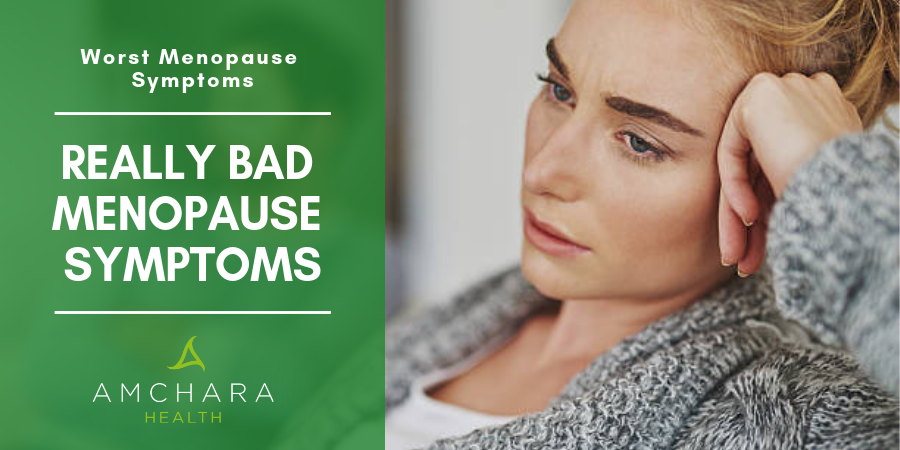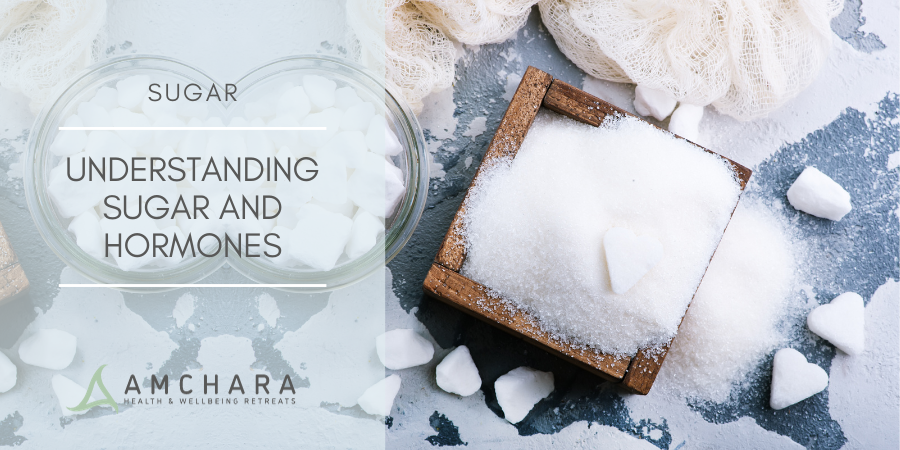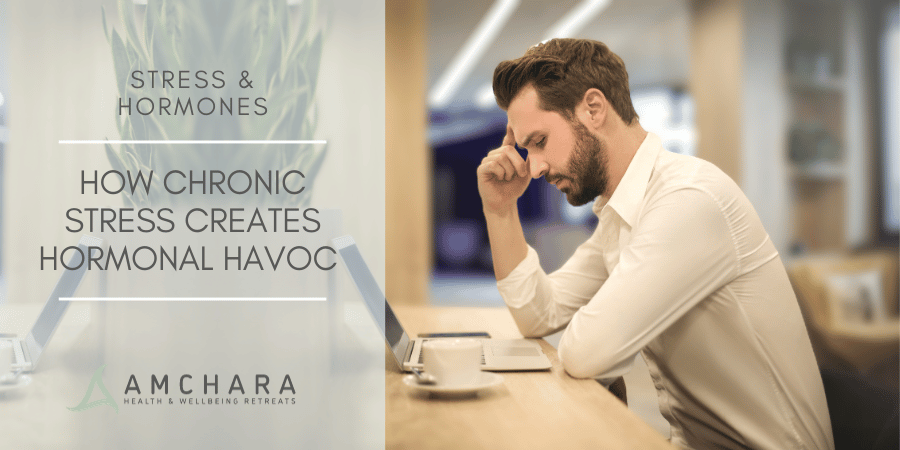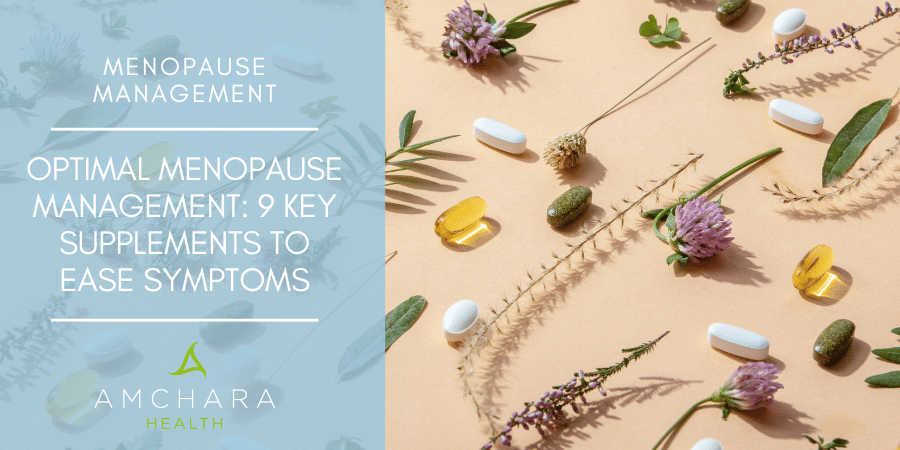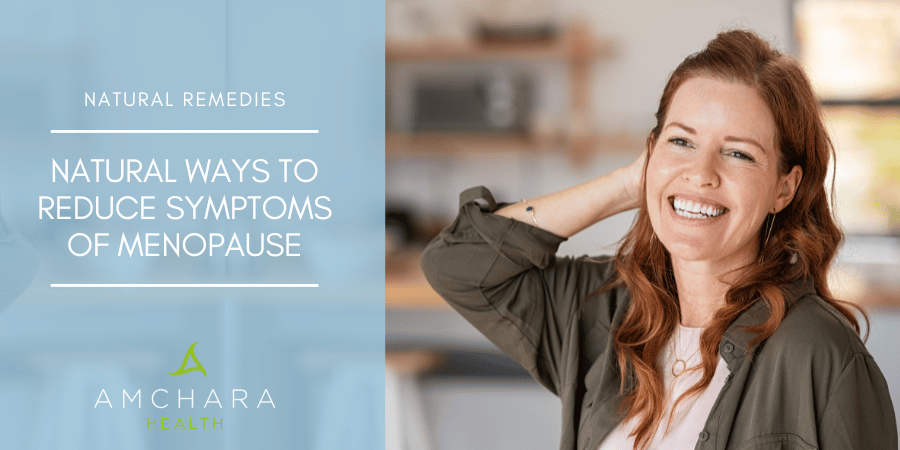There are many aspects of the menopause that can make a woman’s life challenging.
We always take an evidence-based approach and aim to provide you with actionable knowledge and tips to help you on your journey to optimal health.
Quite often aspects of the menopause are openly discussed but there are 3 symptoms in particular that can be really hard to deal with and are often brushed under the carpet.
Let’s find out what these sympyoms are are and what steps you can take to cross them off your symptom list.
The word menopause is from the Greek language – meno (monthly) and pausis (to stop) and literally means ‘stop menstruation’.
It usually affects women between the ages of 45 to 55 and cannot be confirmed until a year after menstruation has ended.
The time during which women gradually stop producing eggs and eventually stop ovulating is commonly called the peri-menopause and lasts on average 2-3 years.
Once ovulation ceases the ovaries stop producing oestrogen and progesterone.
At the same time women experience a decline in testosterone.
These hormonal changes are responsible for the physical and biochemical changes that many women experience during this transitional period.
What’s the worst that can happen at menopause?
First of all it’s important to say that no two women are the same.
Each individual will hvae a different experience of the transition into menopause, but some of the symptoms are common for many women.
The most common symptoms are usually quite openly discussed:
- Night sweats
- Sleepless nights
- Hot flushes
- Poor memory
- Aching joints
- Weight gain
- Fatigue
- Hair loss
- Headaches
The 3 worst menopausal symptoms:
1. Vaginal dryness
Low oestrogen levels can alter the vaginal acidity whilst also affecting the lining of the vagina causing it to become thin and dry. At the same time lubrication in the vaginal area can decrease.1
This combination can make the vulva and vagina sore and itchy and can make sexual intercourse painful.
It may also impact on a woman’s libido and response to sex.
According to Marianne Trevorrow, a naturopathic doctor writing for The Natural Medicine Journal, approximately 50% of women experience atrophic vulvovaginal changes within 7 to 10 years after menopause, along with commonly reported changes in physical sexual function, including decreased arousal, sexual response, and dryness or pain with intercourse. 6
These changes can predispose the vagina and urinary tract to bacterial or yeast infections.1
The urethra, which carries the urine from the bladder, can become dry, irritated and inflamed, increasing the possibility of urine infections.
Because the tissues of the vagina and urethra lose their elasticity, some women are affected by frequent, sudden urges to urinate and may also have to get up regularly during the night to go to the bathroom.
An additional, sometimes embarrassing side effect of this can be an inability to control urination, which can happen when coughing, laughing or lifting heavy objects.3
2. Anger
The menopause can be an emotional rollercoaster with frequent bouts of irritability and mood swings, but for a few individuals anger is a troubling feature that can seem to take over without any warning.
In the same way that hot flushes rise rapidly in the body, intense feelings of anger can come on suddenly.
While the mood swings may have a lot to do with fluctuating female hormone levels 5 , there are other factors that can bring on menopausal anger.
It is common during this transitional life phase to experience insomnia and night sweats that can leave you feeling tired and emotional.
If you’re feeling fragile to start with, sleep deprivation, together with the additional burdens of work and family responsibilities, can make it feel harder to deal with situations.
3. Depression
Depression can be common during the menopausal years.
It has been suggested that women are particularly vulnerable to depression during menopause because of the changes in female reproductive hormones.
According to statistics 1 in 5 women suffer from the emotional side effects of the menopause and it is becoming a recognised health concern. 7
Once again, sleep deprivation caused by other symptoms related to the menopause is seen to be a risk factor for depression.
Difficulty sleeping is one of the hallmarks of menopause and according to research up to half of all women complain of poor sleep during the menopause compared to 15% of the general population. 8
What’s more it seems that trouble sleeping is more common in post- menopausal women than pre-menopausal women. One British study identified that menopausal women were up to 4 times more likely to report poor sleep problems. 8
So what can you do? Let’s take a look at what nature has to offer.
If you are not sure about orthodox medical treatment for menopausal symptoms and are considering taking a natural approach, there are a number of helpful alternatives.
Maca
Maca is a Peruvian plant grown exclusively in the Andes and has been cultivated for more than 2000 years.
It has been used traditionally throughout history for its medicinal properties.
Some clinical trials have shown Maca to be effective for enhancing sexual desire.16
After 8 months of taking Maca capsules, a study on post-menopausal women reported significant improvement in many of their symptoms including depression, low sex drive, tearfulness, hot flushes, night sweats, lack of energy and insomnia.9
Mexican yam
This plant extract is commonly found in creams for topical use.
It contains phytoestrogens that have traditionally been used at the menopause because of their balancing effects on female hormones.
The plant compounds are thought to help increase libido and reduce vaginal dryness.
St John’s Wort
Mood swings and depression can be difficult symptoms to cope with during the menopause.
Several studies have identified that St John’s Wort helps to reduce low mood in menopausal women. 15
Omega-3 and omega-6 essential fatty acids (EFAs)
Foods such as salmon, fresh tuna, sardines seeds, nuts and avocados contain high levels of omega 3 and omega 6 EFAs and help to support hormone production, as well as keep skin lubricated and flexible.
These essential fatty acids also have a protective effect on brain neurotransmitters, which helps with low mood and depression.
5HTP ( 5-Hydroxytryptophan)
5-HTP is a naturally occurring amino acid and a chemical precursor for the production of serotonin.
Depression has been linked to serotonin imbalances in the brain. Since 5-HTP is needed to synthesise serotonin it is believed it may be of therapeutic value. 12
Early research supports the view that 5 HTP has antidepressant properties. 13
In addition to these benefits, because serotonin is also converted into melatonin (which regulates sleep cycles), some studies suggest that 5-HTP may improve sleep quality. 17
Sea Buckthorn oil
The oil of the Sea Buckthorn berry is extremely rich in omega fats – especially the little known omega-7.
This fatty acid plays a significant role in maintaining the integrity of the lining of the vagina, helping to rehydrate dry mucosa. 10
Black Cohosh
This herbal remedy has been used traditionally for decades to reduce hot flushes and night sweats, which may also help to improve sleep.
Several clinical trials support the use of Black Cohosh for menopausal symptoms. 14
Vitamin C
Helps to maintain a healthy vascular system.
It also plays an important role in collagen production, a major component of connective tissue, which is needed to strengthen and support the skin structure.
Both of these attributes may help to keep the vagina healthy.
Valerian
Getting a good night’s sleep can make a huge difference to mood for many menopausal women, reducing emotional extremes such as anger, irritability and depression.
Valerian is commonly used to improve sleep, which is supported by clinical research.
One study in particular found that individuals taking valerian had an 80% greater chance of reporting improved sleep compared with others taking a placebo. 11
Diet and lifestyle tips
- Eating a balanced diet can help to keep the vagina healthy and stabilise moods after the menopause.
- Focus on slow-releasing carbohydrates, balanced with a serving of protein or healthy fats.
- Include whole grains like oats, brown rice, fruits and vegetables plus some good quality protein like fish, beans, poultry nuts, seeds, eggs and tofu.
- Keep an eye on blood sugar levels by reducing sugar, sweets, chocolate and refined foods e.g. white flour, white pasta and white rice. This can prevent the blood sugar dips that may trigger hormone imbalances.
- Reduce your caffeine intake (coffee, tea, cola), which is associated with urinary incontinence. 4
- Use a vaginal lubricant with natural added ingredients such as Mexican yam, and vitamin E. Using a lubricant daily as you would a facial moisturiser encourages vaginal elasticity and reduces dryness and burning due to vaginal atrophy.
- Keep up your exercise routine. Regular exercise post-menopause is excellent for maintaining a feeling of wellbeing and may help to stimulate hormone production. It can also promote a good supply of blood to the vaginal area, which may be of particular benefit.
- Increase your sexual activity too as this will also encourage more blood flow to the vagina, which helps to keep tissue in the area healthy.
According to woman’s health expert Dr Northrup – vaginal atrophy is a common condition that is easily treated. In her opinion, the key to success is a combination of vaginal moisturisers and more sex.2
We welcome your feedback
Do you agree that these are the 3 worst menopause symptoms?
Maybe you don’t and think there are others that are far worse.
We’d love to hear what your personal experience of the menopause has been.
Do you have any suggestions on natural therapies that you found worked for you?
We’d love to hear from you so please leave us a comment in the box below.
(Enquire about your free hormone health consultation today!)
READ NEXT:
